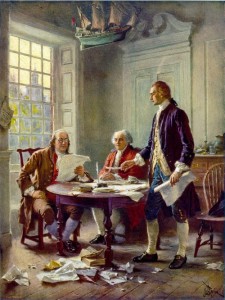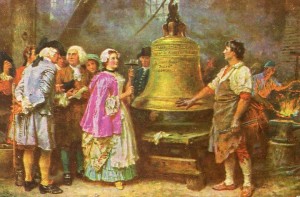
Listen to or download this week’s radio program:
© 2016 Don Pinson / To Download, right-click here: [Download]
Delegates from the American colonies had begun the Continental Congresses on their knees, crying to the God of heaven for help. They had knelt signifying that their rights came from God and that they were appealing to Him to show that their cause was just. Now, in July of 1776, they were again declaring their dependence on Him as they  considered declaring their independence from England. It was in this spirit that Virginia delegate, Richard Henry Lee, would propose the resolution on June 7th that,
considered declaring their independence from England. It was in this spirit that Virginia delegate, Richard Henry Lee, would propose the resolution on June 7th that,
“…these colonies are, and of right ought to be, free and independent states.”
(John Adams and the American Revolution, Catherine Bowen, Little Brown and Co., Boston, 1950, p. 583)
A committee was appointed to draft a Declaration of Independence. Thomas Jefferson would do most of the writing of that Declaration, in which he would declare the reason that caused the separation:
“…We hold these truths to be self-evident, that all men are created equal, that they are endowed by their Creator with certain unalienable rights; that among these are life, liberty, and the pursuit of happiness; that to secure these rights, governments are instituted among men, deriving their just powers from the consent of the governed; that whenever any form of government becomes destructive of these ends, it is the right of the people to alter or to abolish it, and to institute new government…” (emphasis added)
The Declaration was presented to the Continental Congress on Monday, July 1st. Still, they hesitated to make the break. The next day, Dickinson from Pennsylvania spoke against independence in his very eloquent way. A long silence ensued after he sat down. The destiny of future generations hung in the balance. Slowly, John Adams of Massachusetts arose to his feet to speak. He spoke quietly, but with great conviction and emotion:
“Before God, I believe the hour has come. My judgment approves this measure, and my whole heart is in it. All that I have, and all that I am, and all that I hope in this life, I am now ready here to stake upon it…live or die, survive or perish, I am for the Declaration. It is my living sentiment, and by the blessing of God it shall be my dying sentiment. Independence now, and Independence forever!”
(McGuffey’s Fifth Reader; 1907, p. 199)
But even with Adams’ moving appeal, the delegates still hesitated to approve the Declaration. Would sentimental ties with England, or the fear of the devastation of war, keep them from standing with the order of God? Would they, as Patrick Henry had warned, hang on to “peace…at the price of chains and slavery?” (History of the United States of America, George Bancroft 1838, p. 29.) Finally, John Witherspoon, a new delegate now representing New Jersey, arose to his feet. Though unknown to our generation, here was a man greatly respected by our founding generation. Like Patrick Henry, he was of Scotch descent, and had inherited the love of liberty from his ancestors who had fought English tyranny for hundreds of years. As President of Princeton College, he trained many of America’s Founders, and was known as the “man who shaped the men who shaped America.” (Christianity and the Constitution, John  Eidsmoe, Baker, 1987, p. 81). And he loved liberty more than life. In that moment of hesitation he spoke with fiery boldness of the “colonies [being] ripe for independence.” (The Glory of America Calendar, Peter Marshall & David Manuel, 1991) His fervency and boldness won the day. When the vote was taken, independence had won!
Eidsmoe, Baker, 1987, p. 81). And he loved liberty more than life. In that moment of hesitation he spoke with fiery boldness of the “colonies [being] ripe for independence.” (The Glory of America Calendar, Peter Marshall & David Manuel, 1991) His fervency and boldness won the day. When the vote was taken, independence had won!
Their commitment to the cause of re-establishing Godly government was real. They closed the Declaration by saying,
“And for the support of this Declaration, with a firm reliance on the protection of Divine Providence, we mutually pledge to each other our lives, our fortunes, and our sacred honor.”
Many would lose their fortunes. Some would lose their lives. But NONE would lose their sacred honor—because ALL kept their pledge!
What are you willing to give up to defend liberty in this present move toward slavery in America?!
Think about it; because if you don’t, someone else will do your thinking for you—and for your children! And you won’t like what that brings to you. I’m Don Pinson; this has been Think About It.
(This message has been taken from our book Why God Birthed America. You can order a copy of Why God Birthed America at heritageministriesky.com)
